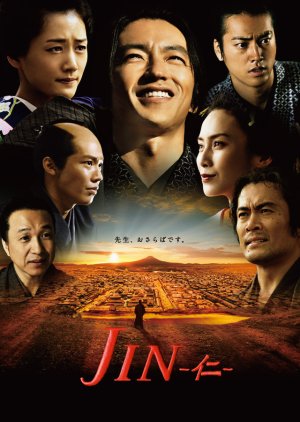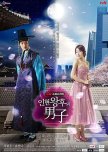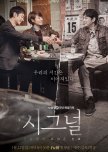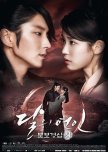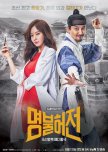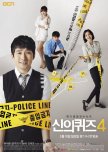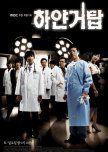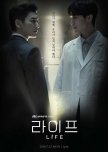Considerați utilă această recenzie?

YueofBlueGables
11 oamenii au considerat această recenzie utilă
This is the first time I see a period drama (a Japanese period drama, that is). I learned so much. First, this character, Sakamoto Ryoma, who is one of Japan's hero (although you would not believe it in this show... he was more like a comedy relief, but I've read some text about him to be more informed). And then, their life styles. This is the 1862 year.
Top-notch things about this wonderful dorama:
- Cast: many familiar faces, but also some new ones. Ayase Haruka has never failed me. She is amazing in everything she does. I think I will like whatever she is in. She plays the daughter of an important family, and she wants to be a doctor (which was not possible in that time, for a woman). Needless to say, she looked gorgeous as Saki-sama, in her kimono and fancy hairdo. Her brother is Koide Keisuke, another actor that has never failed me. He may be a little to tamed here, but I liked him so much he could have said two words in the entire show and I would have still liked him. Other actor that I've recently started to like is Kiritani Kenta (as the doctor Saburi). He has such a funny face, and boy he can act! He was wonderful as the new doctor who practiced his studies with prostitutes. And then it is Nakatani Miki, as Miki and the courtesan Nokaze. WOW, what a pretty, elegant lady. I have seen her only in one movie ("Densha Otoko") and I wasn't impressed. She was too plain, in looks and in acting. Boy did I change my mind! She is beautiful, she moved me with her acting as both Nokaze and Miki. She was so elegant and lady-like as the courtesan. Everything, from her voice to her little movements, were majestic. OMG, even her little feet were elegant. I love her smile, I can't believe I once thought she was plain.
The new faces, for me, were first, Ozawa Takao as Jin. Excellent his role as the doctor. I don't think I will be able to see him in another role, he WAS Dr. Jin. He traveled in time, from present time to Edo time. It was not hard to put into his shoes. Everything he did -every life he saved, every person he met- could change history, and he was afraid of it. But more than anything, he was a doctor, so of course he changed perspectives; his and the people he met. I could understand why two strong females, like Saki and Nokaze, fall in love with him. He was just, he was kind, he was skillful. On the other hand, I could not take sides. I loved Saki, she was an independent woman who was interested in medicine. I loved Nokaze, who had a very sad past and wanted her freedom. I loved Miki, Nokaze's great-great-great-granddaughter and present girlfriend. I could understand why Jin was so aware of the little photograph he took with him (where he and Miki were posing. With every change he made into history, the photograph changed). I don't know how this will end... and although I hate love triangles -or love squares- I wish Jin all the happiness and wisdom to chose a woman among these wonderful women.
At first I thought the actor had a funny face... a bit weird, since his eyes are very apart. But with every laugh I liked him more. He had those tiny wrinkles that made him attractive, he has a nice body and nice teeth. On the other hand, he has a huge Adam's apple (is it weird to take notice of that??)
The actor who played Dr. Ogata was also wonderful. First time I see this man. He did a good job playing the most important doctor in this little town. I was moved by his tears. And I was convinced of his importance and intelligence.
The little boy... waaa, I had tears in my eyes when he was crying for his mother. At first I thought he was a bit annoying and not a good actor, but he proved me wrong with the scene with his mother.
Oh, and Kohinata Fumiyo has a small role as well! He was, of course, wonderful. WOW the number of roles he played so far! One of the most prolific Japanese actors.
The man who played Ryoma-san was good, first time I see him. I just did not like his role that much, mainly because of the way he talked, and also because I just couldn't make up my mind that a guy like him has been the most important guy in Japan history. He was just too... he took things like a joke, which is fine of course, but as Ryoma-san... not so much I guess.
- Setting: the backgrounds were beautiful. The houses -so Japanese-, the gardens! The little red district... the trees! Houses were wide and so clean.
- Costumes: Saki's kimonos and Nokaze's... O_O WOW, beyond gorgeous. Their hairstyles, Nokaze's high shoes, her make-up. I loved one of Saki's kimono which was pink. Or another that was blue with little flowers. Scratch that, I loved ALL her kimonos! From the top of their heads to their tiny feet... everything was pretty.
- The surgeries: I am one of those people that cannot see blood... and since Jin is a doctor who has to perform surgeries -brain surgery, skin surgery, breast surgery...- everything looked very real. I was like O_O OMG. And of course, praying that Jin could save his or her life. It did not always happen -obviously- but I was so happy when he did.
- Soundtrack: the ending song not so much. But the opening and the one that accompanied the most important scenes (by Takami Yu). It was sweet and a bit sad and just beautiful. I loved it and I am currently searching it to have it on my playlist. One of my favorite dorama songs.
Before I decided to watch it, I've read several reviews in order to decide. Most of the reviews said that the end was not good. I think it was good, a bit of a cliffhanger but not a life-or-death problem. It ended like it was supposed to end. Some get their happy ending, some get a HFN. A perfect way to continue a 2nd season, but for people who did not like it so much, it can also end here.
Rewatch value is 100% since I have watched it already twice.
Considerați utilă această recenzie?

The plot is surprisingly cohesive. I believe this is due to the fact that it doesn't linger on the technicalities of time travel itself, that is how did Jin fall into the past, why or what's the trick. By glossing over the sci-fi aspects, the drama can focus on the consequences of his jump, how his being in a place where he should not be is going to change not only his life, but the future he knows, triggering a chain of uncontrollable events.
Furthermore, it gives both the main character as well as the viewers the chance to reflect upon the ethics of the medical profession. In this sense, the drama is at the same time current and timeless.
It's strength however is in the portrayal of 19th century Japan. I grew increasingly fond of the side characters, was enthralled by the Courtesan Nokaze's story - also the most harrowing character in the drama - laughed at Sakamoto Ryoma's antics, adored Ogata sensei's wise demeanour and loved to meet all the other famous historical figures, also finding out that in choosing the cast and costumes, they tried to stay true to the physical appearance of these people as shown in ancient portraits.
All in all, scenography, photography and acting are excellent. Each episode introduces new characters and medical challenges, all of which I found extraordinarily interesting and intriguing, so much that I binge watched 11 episodes in a little more than 2 days and am now eager to start season 2.
The weak point of this show is the music. It's so repetitive, by the end I wanted to tear off my hair. Personally, I'd have appreciated the use of some traditional music, of which there are vague hints here and there, but not enough to establish a mood. I believe the ost is made of only one song and one or two instrumental pieces. A mediocre choice, in my book.
I have no doubt I'm going to re-watch this soon enough, possibly with a watching partner who's as interested as I am in the medical field. I suggest you try out this drama only if you like medical shows: that's the main focus of JIN, so if you're looking for something else you may be disappointed.
Considerați utilă această recenzie?
I really enjoyed Jin as the writer managed to do a very good job of interweaving the emotional situations involving the characters with the medical scenarios and meshing it with the political world of Edo. One or two things that didn't quite come together are as follows:
Time Travel: I've said it in other reviews, and I'll say it again: it never makes sense. Just don't expect some serious explanation for that fetus tumor...yeah, I know. It sounds and is weird. Just go with it and perhaps part 2 will answer that question. But probably not.
Truly that is the only issue I have with the drama. Things I liked:
Actors: I truly thought they all did a good job. There are not many reviews here of Jin, and I took the time to read the "6" rating review because I was interested what the issue was. Drama watching is such an individual thing and what bothers one person another doesn't care about etc. It appears it was the acting style of some of the actors. I think perhaps if this had been my first Japanese drama, I would understand that because there is a certain earnestness sometimes in the way scripts are written and acted out that I have taken this to be a cultural difference especially coming from the K-dramas. All I can say is it's subjective, and I didn't have any issues here. With a few exceptions, it's pretty much what I see in most Japanese dramas.
Writing: This is the key as many genres are rolled into one and blended beautifully. This did not get bogged down in politics even though it's made clear that Japan is in a very tenuous time. I enjoyed how the medical scenarios were addressed and how we learn so much of the time simply by bringing forth what the people needed help addressing. (The time frame is in the 1860s.) Also, all the characters grew as the drama proceeded and the pacing of the story was good. The perk of 11 episodes is no filler.
History: I seem to have learned a lot about what was going on in Japan without even knowing it. That's the sign of a good drama; it is enjoyable while educating me at the same time. Now the choice a viewer will have to make is whether to look up who Ryoma is. Sometimes I do not want to know about history during a drama, but it was very apparent that this was a famous person in Japan, and I didn't think I'd enjoy it as much while our main character is very aware of who he is, what he does, and how he dies. So I did look him up, and I recommend it if you, like me, are unaware of Japanese history. I feel it helped my enjoyment of the drama.
Direction/Music etc: It is beautifully filmed and well done. Costumes are amazing. I liked the song well enough but thought it was a bit over the top sometimes for the times they were playing it. There were no behind the scene issues that hindered my enjoyment of the drama.
Bonus: No psycho women trying to do each other in and actually a bit of a friendship develops between two unlikely gals. Also bromance galore.
So, overall, if you want a quick drama (all episodes 45ish minutes except the first and last), I highly recommend Jin. I plan on starting the sequel shortly though this drama really stands alone. Both are currently on Viki.
Considerați utilă această recenzie?

The main storyline is easy to summarize but interesting with mystery and suspense which makes it a good watch. I kept watching and watching and forgetting time. You get a wonderful view into the Edo period and great setting. The costumes are beautiful and overall everything looks coherent. The story isn't finished with this first season so it's understandable why it ends open. It's an end that makes you curious for the next season.
The actors were all new to me, I haven't seen any of their other works yet. They immediately got me and I now have a few more favorites on my list. For me Osawa Takao stand out as he truly is JIN, to say it with the words of a previous reviewer. I liked how much Jin fears about possibly changing the future with his actions while he's struggling with his ethics of being a doctor. This conflict is well portrayed and adds to the depth the drama has.
Saki is such a lovely character and I enjoyed the scenes with her. Ayase Haruka both perfectly captured Saki's innocence when she didn't know something and determination when it came to learning more about medicine.
The other characters and actors also left an impression and it was a joy to watch them.
In comparison to the Korean version where I mentioned that the music was sometimes out of place, the music of JIN always merged good with the scenes and is also recognizable. It's not a soundtrack I would listen to on its own but it completes the drama. Okay, screw that, I'm listening to it now... ^^'
The rewatch value of this drama is high for me. I already caught myself rewatching particular scenes and ending up watching the whole episode cause I can't stop so it's definitely not the last time I watch it. It made it straight into my favorites list.
Overall I can only recommend this drama. It's a must watch for everyone who likes any of the genres that are included in this drama or someone who knows any of the cast members. Even if you're not into medical or historical drama it's worth a try. As for me I think this drama has this certain something that you can't name but feel it's there.
Considerați utilă această recenzie?
Această recenzie poate conține spoilere
A new take on time travel!
I guess this series was divided into two entries. I watched all 22 episodes. I loved this series and would enjoy watching it again. It was interesting from a cultural point of view, and had many bits of wisdom throughout. I also appreciated the take on time travel and the speculation about its possible effects (or not) on the future, especially the explanation of how timelines could work by Dr. M's colleague towards the end. The penultimate bit at the clinic could not have been more perfect, and the whole story could have ended there, but the actual ending was also okay and left room for more episodes, although I can't imagine what more could be added to this wonderful story. So glad that I watched this!Considerați utilă această recenzie?

Now, my experience with dramas that I've rated really highly overall usually follows the pattern of being drawn in, context being established over a few average episodes and then by the fifth or sixth finding myself completely engrossed in the drama... usually ending on an emotional high, my face full of tears and the memory of what I've just watched poignantly lingering in my mind for days, sometimes weeks, after. That is the magic, where the emotional plight of the people of countries thousands of miles away from our own native land touch our hearts, unite us. Seeing the enthusiastic fanbase for Jin, I imagined myself feeling the same things, becoming engrossed in this drama's elaborate plot.
I decided I could suspend my disbelief, willingly accept the timeslip and travel back to Edo, and on that commitment I paid in full. The setting was never the issue; the viewer always mindful of the strong effort put into embellishing this premodern Japan with all the convincing articles, and the hospital setting within Tokyo felt authentic too.
No, my criticism of this drama lies predominantly in the emotional content, the acting, the melodrama.
Initially I felt overcome, not just by Minakata Jin's painful past, by his sudden departure to historic Edo, but more so by how the drama encouraged you to empathetically connect with the minds of the people who don't understand his methods, struggle to see the good in what appear to be wicked, vulgar and wholly unexplainable actions. For the first couple of episodes this was the most captivating aspect of the drama, but this was very quickly and negatively upstaged by excesses of emotion and enthusiasm. A once rallying "Hai!" rapidly became tedious, regardless of the circumstances. Rather than bringing me closer to the drama, the continuous tears, flashbacks and bowing, with such vehemence that I found myself wincing each time a head hit the floor, created an emotional disconnect.
Furthermore, I felt that the plot didn't actually go anywhere and found myself finishing episodes with no real idea of what the important issues of the coming episode would be. What's worse is I found myself willingly leaving my computer to do other things between the 15 minute parts when streaming the program.
So, to explain my ratings. The story I rated highly for it's cultural and historical content, the insight into premodern Japanese medicine, rituals and social behaviours; I'd also like to comment that despite the usual dodgy baldcaps, the costumes, make-up, special fx and settings were delightful and of a good standard for a television drama. The music was also pleasing, I liked the choice of song for the ending credits and the way it played over the last scenes of each episode and the OST was fitting.
The acting I rated as average since some performances were good, others excruciating, verging on embarrassing although I can't imagine trying to deliver such intensity of emotion allowed for nuance.
I wouldn't feel inclined to watch the drama again, and felt comfortable giving it a 6 overall as while I wouldn't say this drama was more than mediocre, it does at least merit watching for the historical setting if that's of interest to you.
Just my two pennies worth - many people feel differently, as reflected in other reviews and in the ratings overall =)
Considerați utilă această recenzie?

